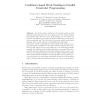Free Online Productivity Tools
i2Speak
i2Symbol
i2OCR
iTex2Img
iWeb2Print
iWeb2Shot
i2Type
iPdf2Split
iPdf2Merge
i2Bopomofo
i2Arabic
i2Style
i2Image
i2PDF
iLatex2Rtf
Sci2ools
202
click to vote
CP
2009
Springer
2009
Springer
Confidence-Based Work Stealing in Parallel Constraint Programming
The most popular architecture for parallel search is work stealing: threads that have run out of work (nodes to be searched) steal from threads that still have work. Work stealing not only allows for dynamic load balancing, but also determines which parts of the search tree are searched next. Thus the place from where work is stolen has a dramatic effect on the efficiency of a parallel search algorithm. This paper examines quantitatively how optimal work stealing can be performed given an estimate of the relative solution densities of the subtrees at each search tree node and relates it to the branching heuristic strength. An adaptive work stealing algorithm is presented that automatically performs different work stealing strategies based on the confidence of the branching heuristic at each node. Many parallel depth-first search patterns arise naturally from this algorithm. The algorithm produces near perfect or super linear algorithmic efficiencies on all problems tested. Real speedup...
CP 2009 | Parallel Search Algorithm | Programming Languages | Work Stealing Algorithm | Work Stealing Strategies |
Related Content
| Added | 22 Nov 2009 |
| Updated | 22 Nov 2009 |
| Type | Conference |
| Year | 2009 |
| Where | CP |
| Authors | Geoffrey Chu, Christian Schulte, Peter J. Stuckey |
Comments (0)

